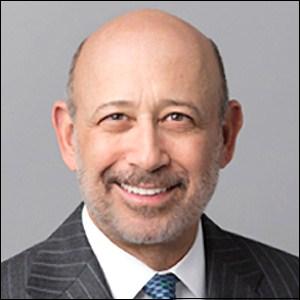What’s Really Behind Goldman Sach’s Bullish Stance on China Stocks?

Lloyd Blankfein, Chairman and CEO of Goldman Sachs
Goldman Sachs is raising eyebrows on Wall Street with its unchecked bullish stance on the stock markets in China, as other major Wall Street firms issue investor cautions or take outright negative outlooks. Communist government intervention in Chinese markets is reaching unprecedented levels of meddling. Companies have been allowed to simply stop trading their shares to halt further price declines; the government has barred executives and key shareholders from selling; margin rules have been lifted; and the central bank is funneling liquidity to brokerage firms.
Since the rout began in June, $3.2 trillion has been shaved from the Chinese stock market with almost 2,800 stocks down 50 percent or more according to Wind Information.
Despite these obvious fault lines, Goldman Sachs has remained steadfastly bullish. But what Goldman Sachs isn’t volunteering to investors is that the company holds stakes itself in Chinese companies which it has yet to unload. Mark Schwartz, Chairman of Goldman Sachs Asia Pacific, also sits on the Board of Directors of a registered lobbyist, the U.S.-China Business Council, which is trying to ram through a Bilateral Investment Treaty with China.
This past February, Goldman sponsored a big conference in New York City to push the treaty and has devoted part of its web site to laudatory videos from the conference. According to Bloomberg Business, Goldman sponsored a similar conference last July in Beijing where Goldman Chairman and CEO Lloyd Blankfein and other execs met with Chinese President Xi Jinping.
What is less known to the general public is that Goldman Sachs has taken significant stakes in a dizzying array of Chinese companies, buying up pieces of everything from poultry farms to a meat-processing company, a drug maker, cement company, banks, insurance company, and even an online gaming and entertainment company.
Goldman has already exited some of these deals with outsized profits. In 2013, the Financial Times reported that Goldman Sachs had exited its stake in the Industrial and Commercial Bank of China with a profit of $7.3 billion for the bank, its private equity partners and some senior partners.
One large position Goldman is not out of, however, according to media reports, is its stake in Taikang Life Insurance. Reuters reported in 2011 that Goldman had acquired a 12 percent stake in the insurance company at a cost of approximately $900 million. Goldman was part of the syndicate planning to launch the company’s Initial Public Offering (IPO) in the fourth quarter of this year. Typically, Goldman would sell part of its stake at that time.

